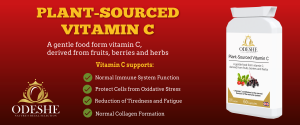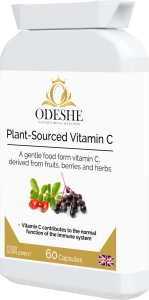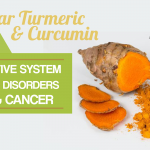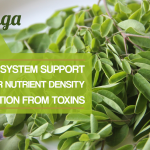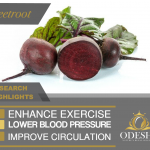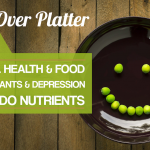With branded blenders and an enticing variety of colours and flavours, blending fruits and vegetables into juices is a popular health & wellness trend. Many sweet fruits are popular ingredients to add, but even without sugary fruits, blending plant materials make more sugar content bioavailable [1,2]. On the up-side, each different vegetable and fruit contain several thousand types of nutrients, vitamins and antioxidants with a plethora of clinically demonstrable health benefits [2,3,4]. So is juicing worth it, or should we just eat fruits and vegetables un-processed?
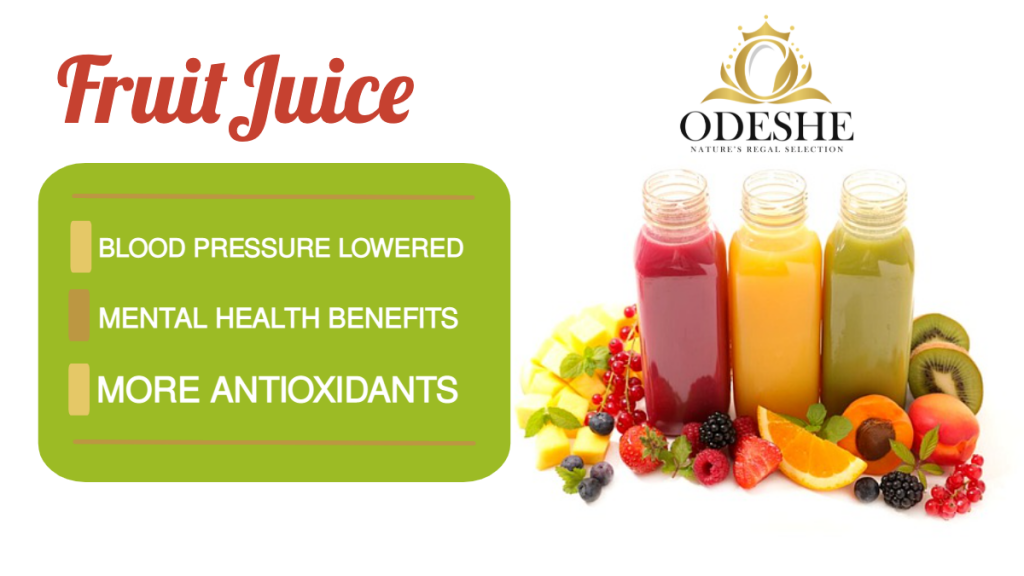
Pure Fruit Juice Power.
A thorough review by Dianne Hyson explores the many times where 100% fruit juices have been tested for their different effects on people [5]. When testing beverages containing nothing but fruit, study after study shows that the regular consumption of pure juices has strong health promoting properties. Health issues and diseases such as high cholesterol, obesity, multiple forms of cancer, high blood pressure anhronic inflammation may all be significantly reduced by regular consumption of different pure fruit juices, and possibly blends that are made solely from 100% fruit content [5].
Fortunately, the fruits that have such potency against a varied assortment of chronic diseases are not rare delicacies only grown in remote jungles! Significant evidence shows that maintaining daily consumption of 100–400 mL of pure juices from regularly available fruits including apples, oranges, pomegranates, grapes, cranberries and grapefruits may help mitigate many, if not all of the aforementioned health concerns [5].
Many of these intervention experiments were small-scale studies (i.e. with anywhere from 9–146 people tested in different experiments ranging from single dose effect to double-blinded controlled studies), and as such require repeating with a larger number of people to undoubtedly prove observations. However, the number of individual, independent studies form their own body of reproducible evidence that regular consumption of pure fruit juices is likely to have reproducible benefits in mitigating chronic diseases.
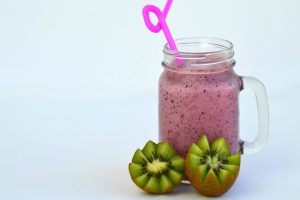
100% Fruit Juice has Many Benefits… (credit: __Sherry__ )
Mental Health.
A small, 3 month study on lifestyle interventions, supplementation and neurological diseases identified that all 21 people who completed the study reported benefits from the strict regime [6]. This study implemented a regime of physical and mindfulness exercises, a strict vegan diet, antioxidant supplementation and 2–4 daily servings of freshly blended fruit and vegetable juices. 15 subjects declared “substantial benefits”, and 5 subjects experienced “major reversals” in their diseases [6]. It is quite impressive that such a varied set of mental health and other diseases (i.e. “…anxiety, depression, poor memory, dementia, Alzheimer’s disease, Parkinson’s disease, history of stroke, or multiple sclerosis…” [6]) were addressed with the same intervention, albeit a comprehensive and possibly “drastic” one. Those who saw their health improve may not mind how pervasive those lifestyle changes were!
But fruit and vegetable juices alone may be powerful enough. Following the diets of over 1,800 people showed that consuming 3 weekly servings of 100% fruit/vegetable juice lowered the relative risk of Alzheimer’s disease by over 75% [7]! The age range of people in this study was 65 years and older, and it appears that senior citizens may get the most cognitive function benefits out of pure fruit/vegetable juice [5]. Far from the observation from a sole study, a review confirmed the cognitive benefit of 100% fruit juices to senior citizens in 2 of 2 observation studies and 3 out of 6 intervention trials [8]. However, there is evidence that 100% purple grape juice was able to boost mood and cognition in 18–35 year olds 25 minutes after consumption of 1 serving [9].
More or Less Nutrients?
In an observational study with over 3,000 women, liquefying fruits and vegetables increases the absorption of beta-carotene, supposedly by releasing this antioxidant from fibre [10]. There are multiple instances of vitamin and mineral intake from diet increasing as a result of drinking due to 100% fruit/vegetable juice [5,11]. As such concerns about a lack of nutrients may only be relevant in cases where moderation is not exercised. Moreover, considering that fruit and vegetables are ranked as the most nutrient-dense food classes [4], replacing solid food calories for blending fruit and vegetables is likely to increase the drinker’s nutrient diversity. However this kind of calorie substitution/replacement is best planned with a nutritionist in order to avoid nutrient deficiency.
Beetroot, Blood Pressure and Exercise.
Beetroot juice has been studied for its ability to lower high blood pressure, and boost exercise performance. Beetroot juice enhances the elasticity of blood vessels in a manner that reduces the blood pressure of hypertensive test participants further than test subjects with normal blood pressure [12]. There is also a reward for consistency with beetroot juice consumption: drinking juice for more than 2 weeks lowers blood pressure further than drinking juice for less than 2 weeks [12].
Athletes were able to perform moderate-to-severe intensity exercise for 22% longer after drinking beetroot juice for 6 days [13]. Beetroot juice enhanced the body’s efficiency in utilising phosphocreatine, the body’s fuel for explosive and high intensity workout [14]. Resting blood pressure of beetroot drinkers was lower than placebo when study participants were resting, and also after they exercised [15]. Because beetroot juice is great at delivering antioxidants and has many other great benefits, check out our full article on Beetroot juice. Cherry juice and cherry powder also have comparable properties to enhance athletic performance [16], speed up muscle recovery [17], as well as dampen pain after strenuous exercise [18].
Sugar Control and Diabetes Risk.
The sugar content available from fruits and vegetables is increased when these foods are blended. The mechanical shearing of plant foods makes more of the fibre content accessible to be broken down further and absorbed as various sugars [2]. A survey of over 3.4 million people identified that regularly drinking fruit juice (i.e. 100% fruit juice or other option was not specified) increased their overall relative risk of developing type 2 diabetes [19]. Substituting fruit juice for whole fruits neutralised any increased relative risk for developing diabetes (specifically oranges; peaches, plums and apricots (assessed as a group); grapefruit; apples and pears (assessed as a group); bananas and prunes) [19]. Moreover, regularly eating blueberries, grapes or apples were associated with lowering the relative risk of developing diabetes [19].
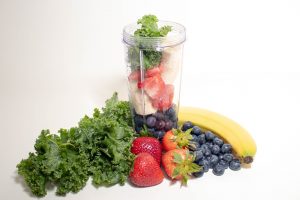
Keeping the Fibre in Fruit Juice brings Added Benefits… (credit: GregReese)
However, fruit juice preparation may be the key to understanding the risk of type 2 diabetes development, because the increased sugar content of blended fruits is exacerbated when the juice is isolated from the fruit’s fibrous pulp content. The fruit’s fibre can no longer act as a gel-like pulp to slow the spread and absorption of sugar [2]. Machines that blend the whole fruit into juice without removing the fibre content (in contrast to many commercial preparations and juicing machines) lowered the impact of fruit juice consumption on the blood sugar levels of healthy test participants [20]. This form of juice preparation, referred to as “nutrient extraction”, was later shown to lower the glycaemic index of fruits given to healthy and obese test subjects who are more sensitive to blood sugar fluctuations [21].
However, a review of pure, 100% fruit juice consumption made the following observation: “It is notable that a number of studies did not find an association between fruit juice and adverse outcomes related to bodyweight, plasma lipids, or blood glucose in adults or children.” [5]. This comparison of studies identified that test participants either maintained healthy blood sugar levels or lowered their blood glucose spike (compared to sugar solutions) after drinking pure juices of either cranberry, pomegranate, orange, apple or grape [5].
Informed Choice
Pure 100% fruit juice has the capacity to address several health concerns, as identified in several studies compared [5]. However elevating blood sugar levels and risking diabetes by drinking fruit juice is a legitimate concern identified in long-term studies [19]. Alongside switching juice consumption for whole fruit consumption, nutrient extraction that maintains fibre content in pure fruit juice may offer an additional protection against chronic blood sugar elevation and developing type 2 diabetes [21]. Other advantages of nutrient extraction are fibre-associated nutrients, and the effect of fibre content to stimulate healthy gut bacterial diversity [22]. For pure fruit juice lovers who want the health benefits juicing can provide, combining nutrient extraction with regular consumption of well-selected herbs may provide a synergistic solution.
by The Odeshe Team.
Disclaimer: If you have medical concerns, please consult your doctor before implementing the opinions in this article.
(References)
[1] M.J. Sadler, S. Gibson, K. Whelan, M.-A. Ha, J. Lovegrove, J. Higgs, Dried fruit and public health — what does the evidence tell us?, International Journal of Food Sciences and Nutrition. 70 (2019) 675–687.
[2] T.W. George, C. Niwat, S. Waroonphan, M.H. Gordon, J.A. Lovegrove, Effects of chronic and acute consumption of fruit- and vegetable-puree-based drinks on vasodilation, risk factors for CVD and the response as a result of the eNOS G298T polymorphism: Conference on ‘Multidisciplinary approaches to nutritional problems,’ Proceedings of the Nutrition Society. 68 (2009) 148–161.
[3] M.F. McCarty, Vegan proteins may reduce risk of cancer, obesity, and cardiovascular disease by promoting increased glucagon activity, Medical Hypotheses. 53 (1999) 459–485.
[4] A. Drewnowski, V.L. Fulgoni III, Nutrient density: principles and evaluation tools, The American Journal of Clinical Nutrition. 99 (2014) 1223S-1228S.
[5] D.A. Hyson, A Review and Critical Analysis of the Scientific Literature Related to 100% Fruit Juice and Human Health, Adv Nutr. 6 (2015) 37–51.
[6] G. Null, L. Pennesi, M. Feldman, Nutrition and Lifestyle Intervention on Mood and Neurological Disorders, J Evid Based Complementary Altern Med. 22 (2017) 68–74.
[7] Q. Dai, A.R. Borenstein, Y. Wu, J.C. Jackson, E.B. Larson, Fruit and Vegetable Juices and Alzheimer’s Disease: The Kame Project, The American Journal of Medicine. 119 (2006) 751–759.
[8] D.J. Lamport, C. Saunders, L.T. Butler, J.P. Spencer, Fruits, vegetables, 100% juices, and cognitive function, Nutrition Reviews. 72 (2014) 774–789.
[9] C.F. Haskell-Ramsay, R.C. Stuart, E.J. Okello, A.W. Watson, Cognitive and mood improvements following acute supplementation with purple grape juice in healthy young adults, Eur J Nutr. 56 (2017) 2621–2631.
[10] J.K. Kolodziejczyk, S.W. Flatt, L. Natarajan, R. Patterson, J.P. Pierce, G.J. Norman, Associations of Soluble Fiber, Whole Fruits/Vegetables, and Juice with Plasma Beta-Carotene Concentrations in a Free-Living Population of Breast Cancer Survivors, Women & Health. 52 (2012) 731–743.
[11] C.E. O’Neil, T.A. Nicklas, G.C. Rampersaud, V.L. Fulgoni III, 100% Orange juice consumption is associated with better diet quality, improved nutrient adequacy, decreased risk for obesity, and improved biomarkers of health in adults: National Health and Nutrition Examination Survey, 2003–2006, Nutr J. 11 (2012) 107.
[12] Z. Bahadoran, P. Mirmiran, A. Kabir, F. Azizi, A. Ghasemi, The Nitrate-Independent Blood Pressure–Lowering Effect of Beetroot Juice: A Systematic Review and Meta-Analysis, Adv Nutr. 8 (2017) 830–838.
[13] B.C. Breese, M.A. McNarry, S. Marwood, J.R. Blackwell, S.J. Bailey, A.M. Jones, Beetroot juice supplementation speeds O2 uptake kinetics and improves exercise tolerance during severe-intensity exercise initiated from an elevated metabolic rate, American Journal of Physiology-Regulatory, Integrative and Comparative Physiology. 305 (2013) R1441–R1450.
[14] S.J. Bailey, J. Fulford, A. Vanhatalo, P.G. Winyard, J.R. Blackwell, F.J. DiMenna, D.P. Wilkerson, N. Benjamin, A.M. Jones, Dietary nitrate supplementation enhances muscle contractile efficiency during knee-extensor exercise in humans, Journal of Applied Physiology. 109 (2010) 135–148.
[15] J.-S. Lee, C.L. Stebbins, E. Jung, H. Nho, J.-K. Kim, M.-J. Chang, H.-M. Choi, Effects of chronic dietary nitrate supplementation on the hemodynamic response to dynamic exercise, American Journal of Physiology-Regulatory, Integrative and Comparative Physiology. 309 (2015) R459–R466.
[16] P.T. Morgan, M.J. Barton, J.L. Bowtell, Montmorency cherry supplementation improves 15-km cycling time-trial performance, Eur J Appl Physiol. 119 (2019) 675–684.
[17] K. Levers, R. Dalton, E. Galvan, A. O’Connor, C. Goodenough, S. Simbo, S.U. Mertens-Talcott, C. Rasmussen, M. Greenwood, S. Riechman, S. Crouse, R.B. Kreider, Effects of powdered Montmorency tart cherry supplementation on acute endurance exercise performance in aerobically trained individuals, J Int Soc Sports Nutr. 13 (2016) 22.
[18] G. Howatson, M.P. McHugh, J.A. Hill, J. Brouner, A.P. Jewell, K.A.V. Someren, R.E. Shave, S.A. Howatson, Influence of tart cherry juice on indices of recovery following marathon running, Scandinavian Journal of Medicine & Science in Sports. 20 (2010) 843–852.
[19] I. Muraki, F. Imamura, J.E. Manson, F.B. Hu, W.C. Willett, R.M. van Dam, Q. Sun, Fruit consumption and risk of type 2 diabetes: results from three prospective longitudinal cohort studies, BMJ. 347 (2013).
[20] K.M. Redfern, V.L. Cammack, N. Sweet, L.A. Preston, M.A. Jarvis, G.A. Rees, Nutrient-extraction blender preparation reduces postprandial glucose responses from fruit juice consumption, Nutrition & Diabetes. 7 (2017) e288–e288.
[21] R. Alkutbe, K. Redfern, M. Jarvis, G. Rees, Nutrient Extraction Lowers Postprandial Glucose Response of Fruit in Adults with Obesity as well as Healthy Weight Adults, Nutrients. 12 (2020) 766.
[22] D.A. Kieffer, R.J. Martin, S.H. Adams, Impact of Dietary Fibers on Nutrient Management and Detoxification Organs: Gut, Liver, and Kidneys, Advances in Nutrition. 7 (2016) 1111–1121.
